December 10, 2020
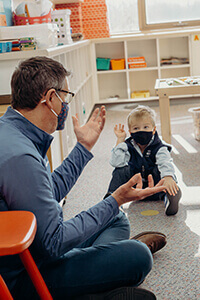 Thirty-nine years ago this week, 13 people from throughout Minneapolis and St. Paul gathered with Bob and Lois (now Sandy Kreischer Smith) Kreischer to articulate their shared dream of founding an independent school in the east metro of St. Paul. In his introduction that evening, Bob said, “We are aware that this could be the start of something big and equally aware that this could totally end in a month or so.” At the end of the meeting, a vote was taken to officially establish Mounds Park Academy. The Articles of Incorporation were filed on December 11 with the State of Minnesota designating Mounds Park Academy as an educational nonprofit on December 14, 1981.
Thirty-nine years ago this week, 13 people from throughout Minneapolis and St. Paul gathered with Bob and Lois (now Sandy Kreischer Smith) Kreischer to articulate their shared dream of founding an independent school in the east metro of St. Paul. In his introduction that evening, Bob said, “We are aware that this could be the start of something big and equally aware that this could totally end in a month or so.” At the end of the meeting, a vote was taken to officially establish Mounds Park Academy. The Articles of Incorporation were filed on December 11 with the State of Minnesota designating Mounds Park Academy as an educational nonprofit on December 14, 1981.
Bob had been the Middle School director of Breck School and Lois was an artist. Both had a dream of a school that would educate the whole child (before the term became popular) and a different kind of college-prep program that while focused on academic excellence, was committed to helping each student reach their potential. They also knew the importance of a teacher that “enjoys and really cares about their students” and a curriculum that “best meets the individual student’s needs.”
Bob understood, and Lois knew, the integral role of the arts in developing the whole child. The early foundations of the school were built upon a diversity, the joy of learning, independent thinking, curiosity, interdisciplinary learning, developing a sense of responsibility, and global awareness. These values may not seem out of the ordinary now, but in 1981 they were groundbreaking and innovative. Read More
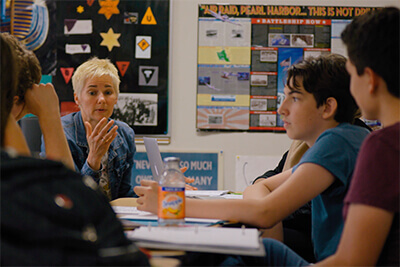 by Dr. Bill Hudson, Head of School
by Dr. Bill Hudson, Head of School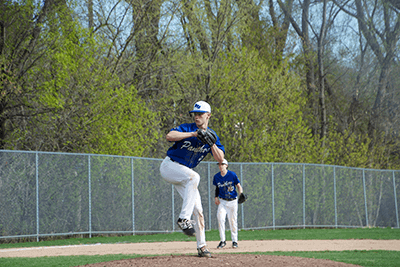 Playing one of America’s greatest pastimes has been one of the greatest privileges of my life. When I was younger, baseball was always the most fun and something I’d look forward to in the summer. Being an athletic kid, it came particularly easy to me. I was fast, I could also hit the ball pretty well, and I was exceptional at catching and throwing. On top of that, I’m a lefty, among the most desired traits in baseball players. As I continued to progress through youth baseball, my team won a lot of games and tournaments. We had a great coaching staff that was knowledgeable and brought tremendous energy. They really wanted us to succeed. However, when high school came along, and the pressures of the recruiting environment began to ramp up, my relationship with baseball began to change.
Playing one of America’s greatest pastimes has been one of the greatest privileges of my life. When I was younger, baseball was always the most fun and something I’d look forward to in the summer. Being an athletic kid, it came particularly easy to me. I was fast, I could also hit the ball pretty well, and I was exceptional at catching and throwing. On top of that, I’m a lefty, among the most desired traits in baseball players. As I continued to progress through youth baseball, my team won a lot of games and tournaments. We had a great coaching staff that was knowledgeable and brought tremendous energy. They really wanted us to succeed. However, when high school came along, and the pressures of the recruiting environment began to ramp up, my relationship with baseball began to change.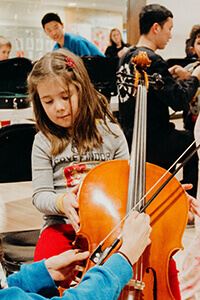 How many seven year old kids can say they play in a band? First grader Eloise can! Through School of Rock in St. Paul, Eloise plays the keyboard, performing hits with her band like “Great DJ” by the Ting Tings and Janelle Monae’s “Dance Apocalyptic”. “I like working with a group to make music and getting to know new people and I like my teachers,” says Eloise. “They make playing music together fun! I really like learning new songs and chords. I like to find notes on the keyboard that match the song and rhythm.”
How many seven year old kids can say they play in a band? First grader Eloise can! Through School of Rock in St. Paul, Eloise plays the keyboard, performing hits with her band like “Great DJ” by the Ting Tings and Janelle Monae’s “Dance Apocalyptic”. “I like working with a group to make music and getting to know new people and I like my teachers,” says Eloise. “They make playing music together fun! I really like learning new songs and chords. I like to find notes on the keyboard that match the song and rhythm.”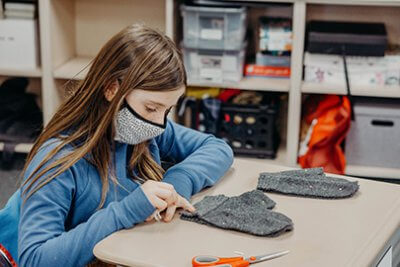 by Dr. Bill Hudson, Head of School
by Dr. Bill Hudson, Head of School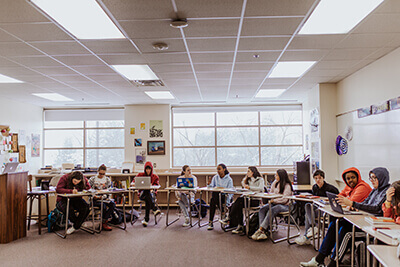 Sixteen faces appear on Zoom as Upper School English teacher Lauren Drake begins her Western and Global Literature course. It’s a Wednesday afternoon and these tenth graders listen patiently as Drake explains how the main item on today’s agenda will work; the class’ first Socratic Seminar of the quarter. Today’s Socratic Seminar is a comparison of Mary Shelley’s “Frankenstein”, Plato’s “Allegory of the Cave”, Ralph Waldo Emerson’s essay “Nature”, and a collection of William Wordsworth poetry. Drake explains the grading rubric, recaps the seminar’s norms, and reminds students to think about the space they inhabit in group discussions. Then it’s go time and students jump right in, starting with an examination of prompt one, a comparison of the uses of light and dark imagery in “Allegory of the Cave” and “Frankenstein”.
Sixteen faces appear on Zoom as Upper School English teacher Lauren Drake begins her Western and Global Literature course. It’s a Wednesday afternoon and these tenth graders listen patiently as Drake explains how the main item on today’s agenda will work; the class’ first Socratic Seminar of the quarter. Today’s Socratic Seminar is a comparison of Mary Shelley’s “Frankenstein”, Plato’s “Allegory of the Cave”, Ralph Waldo Emerson’s essay “Nature”, and a collection of William Wordsworth poetry. Drake explains the grading rubric, recaps the seminar’s norms, and reminds students to think about the space they inhabit in group discussions. Then it’s go time and students jump right in, starting with an examination of prompt one, a comparison of the uses of light and dark imagery in “Allegory of the Cave” and “Frankenstein”.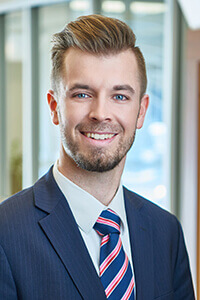 The realization for Mike Velin ’06 came over several weeks in 2002. An excellent student in his elementary and early middle school years, school stopped coming as easily when Mike entered eighth grade. “I was getting straight As all the way through middle school, and then all of a sudden, I was getting Ds,” he says. “Something just switched where I wasn’t engaged. I wasn’t happy or passionate anymore.” In response, the Velin family started thinking about Mike’s education as an investment, and recognized that part of his struggles could be attributed to the fact they weren’t investing in Mike’s education as much as they could be. “Going through that experience was very transformative for our family,” he says. “Because in the end we found MPA, and it influenced the rest of my life, the way that I approach my career, my relationships, how I view the world.”
The realization for Mike Velin ’06 came over several weeks in 2002. An excellent student in his elementary and early middle school years, school stopped coming as easily when Mike entered eighth grade. “I was getting straight As all the way through middle school, and then all of a sudden, I was getting Ds,” he says. “Something just switched where I wasn’t engaged. I wasn’t happy or passionate anymore.” In response, the Velin family started thinking about Mike’s education as an investment, and recognized that part of his struggles could be attributed to the fact they weren’t investing in Mike’s education as much as they could be. “Going through that experience was very transformative for our family,” he says. “Because in the end we found MPA, and it influenced the rest of my life, the way that I approach my career, my relationships, how I view the world.” Thirty-nine years ago this week, 13 people from throughout Minneapolis and St. Paul gathered with Bob and Lois (now Sandy Kreischer Smith) Kreischer to articulate their shared dream of founding an independent school in the east metro of St. Paul. In his introduction that evening, Bob said, “We are aware that this could be the start of something big and equally aware that this could totally end in a month or so.” At the end of the meeting, a vote was taken to officially establish Mounds Park Academy. The Articles of Incorporation were filed on December 11 with the State of Minnesota designating Mounds Park Academy as an educational nonprofit on December 14, 1981.
Thirty-nine years ago this week, 13 people from throughout Minneapolis and St. Paul gathered with Bob and Lois (now Sandy Kreischer Smith) Kreischer to articulate their shared dream of founding an independent school in the east metro of St. Paul. In his introduction that evening, Bob said, “We are aware that this could be the start of something big and equally aware that this could totally end in a month or so.” At the end of the meeting, a vote was taken to officially establish Mounds Park Academy. The Articles of Incorporation were filed on December 11 with the State of Minnesota designating Mounds Park Academy as an educational nonprofit on December 14, 1981.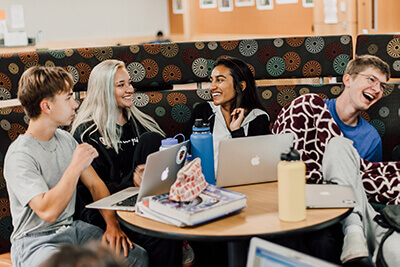 Each year, nearly nine out of every ten newly enrolled families have some previous connection to MPA. It could be that their colleague is an alum, a neighbor has kids here, or a friend from dance goes to MPA. Word of mouth is an incredibly important way to share MPA, and here are three easy things that a busy parent can do to help spread the word.
Each year, nearly nine out of every ten newly enrolled families have some previous connection to MPA. It could be that their colleague is an alum, a neighbor has kids here, or a friend from dance goes to MPA. Word of mouth is an incredibly important way to share MPA, and here are three easy things that a busy parent can do to help spread the word. This interview
This interview